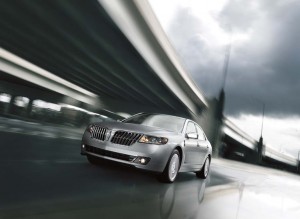
Lincoln plans to offer the hybrid version of its 2011 MKZ for the same price as a standard powertrain.
Lincoln will launch its new 2011 MKZ Hybrid at the same price as the conventionally-powered version of the luxury sedan, the first time an automaker has decided to forego the normal price premium for a gasoline-electric drivetrain.
The move, which Ford Motor Co. officials suggest will be repeated on other Lincoln hybrids to come, is part of a plan to re-establish Lincoln as a serious competitor in the luxury market, something that has become all the more critical in light of Ford’s recent decision to abandon the mid-range Mercury brand, with which Lincoln had long been paired.
“We think they (customers) will be even more excited to learn they sacrifice nothing to be able to go green in style,” said John Felice, general manager of Ford and Lincoln Marketing.
When the 2011 Lincoln MKZ Hybrid hits showrooms it will carry a base price of $35,180, the same as the MKZ model using a 3.5-liter V6. The hybrid relies on a smaller 2.5-liter inline-four engine modified to work with a battery-electric driveline. Like the technology used by arch-rival Toyota in such models as its Lexus GS hybrid, the Lincoln system can be driven short distances on electric power alone, though the hybrid technology will more often provide an extra boost of power using energy recaptured during braking or coasting.
The result is a vehicle capable of delivering 41 mpg in city driving, Lincoln notes, about 6 mpg more than the comparably-sized Lexus HS250h hybrid. Typically, so-called “full” hybrids command a premium of several thousand dollars over conventional gasoline drivetrains. The Ford Escape Hybrid is $8,840 more than the standard version of the SUV – though that premium also covers a variety of upscale features, including an onboard navigation system.
“This is an important step to distinguish Lincoln from the (mainstream) Ford brand,” notes Joe Phillippi, auto analyst with AutoTrends Consulting. It also helps put Lincoln on the map for shoppers who’ve long ignored the brand, a sales laggard in the U.S. luxury market.
But Ford Motor Co. can no longer tolerate that. In the four years since CEO Alan Mulally has come onboard, the Detroit automaker has sold off an assortment of international luxury brands – Aston Martin, Jaguar, Land Rover and, most recently, Volvo – and will now abandon the Mercury division.
With just two brands left, it cannot tolerate an also-ran, acknowledged a senior company source. Lincoln has already committed to adding seven new products to its line-up by 2014, critical in a luxury segment marked by rapid segmentation. The list includes the new MKX, a heavily updated version of Lincoln’s small crossover coming for 2011, a new luxury vehicle in the compact C-segment and five others yet to be identified. Some analysts believe that list will have to be further expanded to make Lincoln truly competitive with luxury players like Lexus, Mercedes-Benz and BMW.
The Ford subsidiary has also announced a new, free maintenance program, though that’s an option that other makers, including BMW and Cadillac, now have or previously offered.
“Lincoln has been an afterthought for a long time,” contends Phillippi. “They hadn’t put much effort in going after the premium and upper luxury segment. “ Without Mercury to help balance out the portfolio and bring in additional buyers, Ford has to, “pour massive amounts of money into the brand. We know that’s what Cadillac has done to be viewed as a competitive player in the segment.”
Lincoln certainly needs a boost. While its sales are up 7.5% for the year through June 30, the industry posted a 17% increase overall. The MKZ, pre-hybrid, actually experienced a 5% decline.
Hybrids have been gaining ground in the American market, though they still account for barely 3% of overall sales, according to industry data, a figure that has been suppressed, analysts contend, by the hefty premium for the technology. Bringing prices down, it is believed, should help expand interest.
The good news is that as hybrid sales slowly ramp up, costs for the underlying components has been dropping, sometimes substantially. That apparently helped Lincoln planners make the business case for the no-premium pricing strategy on the 2011 MKZ.

What it really means that the incentives will be smaller on the Hybrid than the gas model.
LOL!